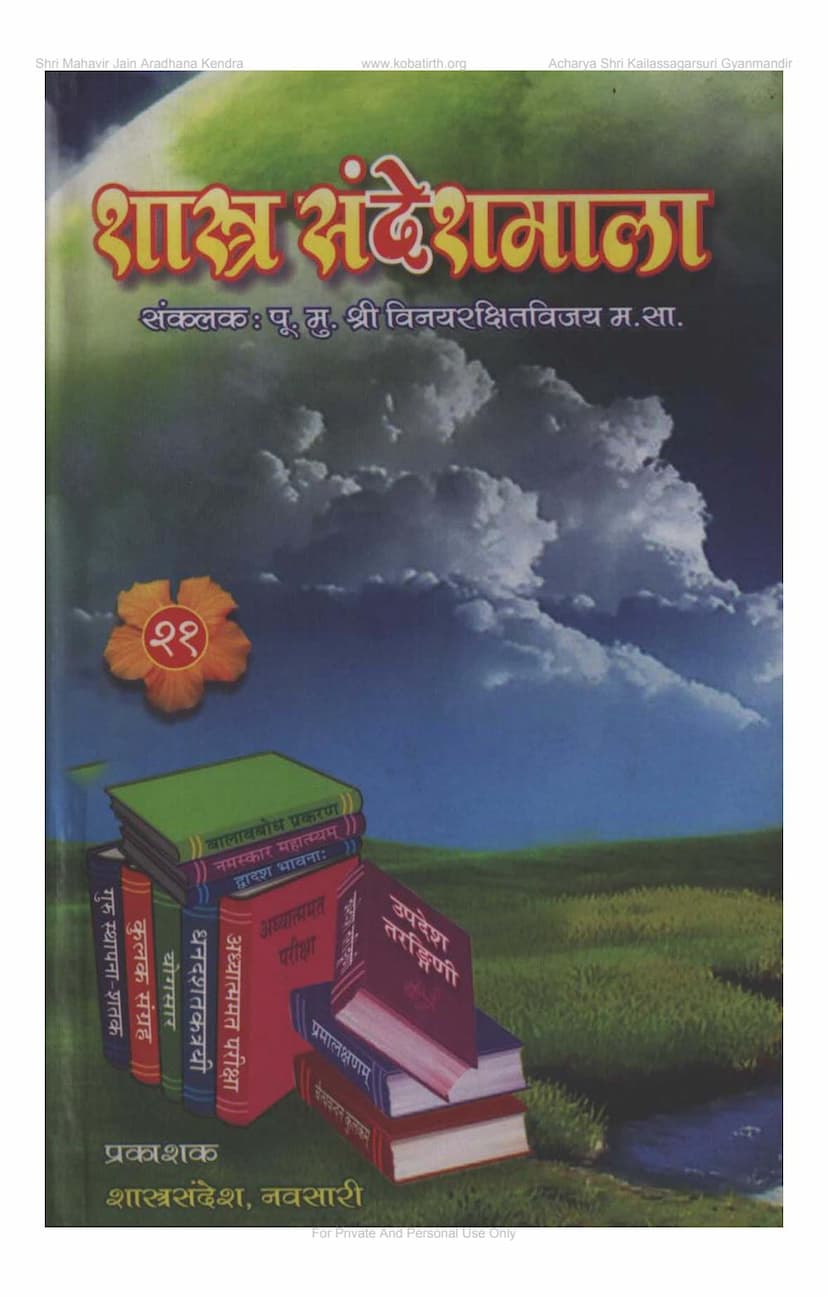Shastra Sandeshmala Part 21
Added to library: September 2, 2025

Summary
Here's a comprehensive summary of the Jain text "Shastra Sandeshmala Part 21," authored by Vinayrakshitvijay and published by Shastra Sandesh Mala, based on the provided pages:
Overview of the Text:
"Shastra Sandeshmala Part 21" is part of a larger series aiming to publish ancient Jain scriptures. This particular volume is the 21st installment and is described as a collection of works related to "Shatak, Kula, Bhavana, and Charcha." The text is compiled by P.P. Muni Shri Vinayrakshitvijayji M.Sa., a disciple of P.P. Acharya Bhagwant Shrimad Vijay Ramchandrasurishwarji and a disciple of P. Punyasurishwarji Bodhiratnavijayji M.Sa.
Content and Structure:
The book contains a compilation of various Jain texts, primarily in Sanskrit and Prakrit, focusing on different aspects of Jain philosophy, ethics, and practices. The table of contents (Anukramanika) reveals a diverse range of topics covered, including:
- Philosophical and Ethical Treatises: Works like "Adhyatmatmatpariksha" (Examination of the Spiritual Nature), "Gurusthapana-Shatak" (Century on Guru Establishment), and "Mukhakshatak" (Century on Fools) address spiritual understanding, the importance of a Guru, and practical advice.
- Didactic and Moral Literature: Several "Shataks" (centuries) and "Kulaks" (a type of verse collection) focus on ethics and morality, such as "Niti-Dhanadashatak" (Century on Ethical Wealth) and "Vairagya-Dhanadashatak" (Century on Detached Wealth).
- Devotional and Ritualistic Texts: Sections like "Namaskara Mahatmya" (Glory of the Namaskara Mantra) and "Navapada Mahatmya Garbhita Prakaran" (Chapter Containing the Glory of the Nine Sacred Entities) highlight devotional aspects.
- Disciplinary and Practical Guidance: Works like "Jain Vihar Shatak" (Century on Jain Conduct) and "Pratyakhyana Kula" (Collection on Renunciation) offer guidance on daily practices and spiritual discipline.
- Discourse and Exposition: Texts like "Upadesh Tarangini" (Wave of Counsel) and "Dharma Upadesh Shlokah" (Verses of Religious Counsel) provide teachings and guidance.
- Meditation and Contemplation: The inclusion of "Dhyana Kathaanak Kula" (Collection of Meditative Narratives) and "Dvadash Bhavana" (Twelve Reflections) points towards introspective practices.
Key Features and Contributions:
- Compilation and Preservation: The series, and specifically this volume, plays a crucial role in preserving and making accessible a vast amount of Jain literature that might otherwise be scattered or difficult to obtain.
- Scholarly Effort: The text acknowledges the rigorous process of "Pramanjana-Shuddhi" (rectification and purification) by esteemed scholars like P.P. Muni Shri Hitrakshitvijayji M.Sa., P.P. Muni Shri Shruttilak Vijayji M.Sa., P. Sa. Shri Bhadrajnashriji M., and Panditratna Shri Ratibhai Chimanlal Doshi, ensuring the accuracy and authenticity of the content.
- Financial Support: The publication is made possible through the "Jnanadravya" (wealth of knowledge) of various Jain trusts and organizations, highlighting a community effort in promoting religious literature.
- Authoritative Sources: The texts included are attributed to ancient and respected Jain scholars and acharyas, lending significant authority to the content. The inclusion of works by prominent figures like Acharya Shri Hemchandrasurishwarji further emphasizes this.
- Extensive Scope: The "Shastra Sandeshmala" series, as indicated by the mention of Parts 1-24, covers a remarkably broad spectrum of Jain literature, indicating a comprehensive approach to religious scholarship.
Specific Content Highlights (based on the index):
The table of contents provides a detailed breakdown of the 48 included works. Some notable texts and their approximate verse counts (where indicated) include:
- Adhyatmatmatpariksha (1-18 verses): Discusses spiritual philosophy.
- Jainviharshatak (19-35 verses): Ethical conduct for Jain monks/followers.
- Nitidhanadashatak (36-52 verses): Ethical principles related to wealth.
- Vairagyadhanadashatak (52-70 verses): Detachment and wealth.
- Shrungara-Vairagya-Tarangini (52 verses): Blending of worldly love and detachment.
- Guru Mahatmya (10 verses): Significance of a Guru.
- Murkhashatak (26 verses): Observations on foolishness.
- Kula (Collection) works: A significant portion of the book comprises "Kulaks" focusing on various aspects like Jambu Swami, Guru Mahatmya, religious vows (Pratyakhyana, Tap, Shravaka Vrata), reflections (Bhavana), and general counsel.
- Upadesh Tarangini (129 verses): A lengthy compilation of advice.
- Namaskara Mahatmya (218 verses): Extensive exploration of the Namaskara mantra.
- Yogasara (206 verses): Principles of Yoga.
- Dvadash Bhavana (14 verses + 44 verses + 133 verses): Detailed exposition of the twelve spiritual reflections.
Overall Purpose:
The "Shastra Sandeshmala" series, through Part 21, aims to provide readers with access to profound Jain teachings that guide towards spiritual purification, ethical conduct, and ultimate liberation (Moksha). It serves as a valuable resource for Jain scholars, practitioners, and anyone interested in understanding the rich philosophical and ethical heritage of Jainism. The emphasis on scholarly compilation and the inclusion of diverse texts underscore the commitment to preserving and disseminating this invaluable knowledge.